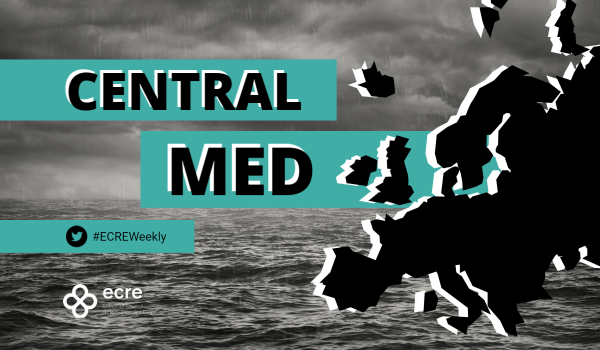At least eight new deaths confirmed and more than 1,000 lives have been lost on the central Mediterranean route and many bodies are still unrecovered. More than 700 survivors disembark in Italy as Malta’s non-response tactics claim the life of a child. Brutal video footage of the abuse of a child illustrates “rampant” violence against migrants.
The unsafe routes across the central Mediterranean have claimed more than 1,000 lives in 2022 as of 3 September and many of the victims remain at the bottom of the sea. Over 30 dead bodies from a fatal tragedy off Lebanon in April still need to be recovered. “There was a woman on the bottom of the sea, her body was trapped in the porthole, while she was holding her baby,” stated a member of a rescue team attempting to recuperate the bodies in an operation financed through the fundraising efforts by family members of the victims of the shipwreck. The latest tragedy happened on 8 September when at least eight people were confirmed dead, and another 15 have were declared missing after their boat sank off the Tunisian coast from where they had departed attempting to reach Italy.
On 4 September, SOS MEDITERRANEE could finally confirm the disembarkation in the southern Italian port of Taranto, of 459 remaining survivors aboard its rescue vessel Ocean Viking. According to the organisation, the hundreds of survivors including 60 unaccompanied children found a safe port, only “after a 15h disembarkation process and up to 11 days spent stranded on our ship”. On 8 September, MSF Sea reported: “The Geo Barents finally reached Taranto, the place of safety assigned to the 267 survivors rescued last week”. The confirmation of the disembarkation of survivors including 45 unaccompanied children came days after the organisation had regretted their “7 long days of waiting”. The NGO hotline Alarm Phone had announced the disembarkation in Italy of another 80 survivors on 5 September – the group had departed from Lebanon. Meanwhile, the civil fleet continues to save lives. The German organisation, Mission Lifeline reported on 6 September the rescue of 54 people from an unseaworthy wooden boat. According to the organisation the people had already been at sea for three days and many were dehydrated, seasick and had injuries. On the evening of the same day, SOS Humanity International reported the rescue of 111 people including 86 unaccompanied children in Libyan waters by its rescue vessel Humanity 1 in cooperation with the Nadir vessel operated by RESQSHIP. Several boats in distress were reported off Libya on 5 September leaving respectively 35 and 21 lives at risk. Their fate remains unclear.
Maltese tactics of non-response to distress alerts and disembarkation requests claimed the life of a four-year-old girl. The girl died while being transferred to a hospital in Crete by helicopter on 6 September after having departed from Lebanon on 25 August along with another 60 people. Alarm Phone alerted authorities on 4 September that the leaking boat was adrift in the Maltese SAR zone with no food or water left. But despite continued alerts and several merchant ships present in the area, no rescue was conducted before 7 September after drifting for days in Maltese and Greek waters. Alarm Phone, stated: “We are so deeply disgusted by yet another instance of non-assistance that ended deadly! All authorities were informed and could have easily averted this disaster. Merchant vessels nearby could have intervened and rescued”. The NGO hotline had reported another incident of Maltese non-response
on 3 September of 90 people in distress in the Maltese SAR zone after fleeing Libya – contact with the group was lost on 4 September. Another 33 people were left drifting just off the coast of Malta on 8 September. Video footage of the Armed Forces of Malta allegedly coordinating a pushback to Libya was released on 3 September.
Brutal video footage showing the abuse of a 15-year-old refugee by kidnappers in Libya has caused widespread alarm and according to Cairo-based correspondent, Sam Magdy illustrates: “how abuses, torture, sexual violence and killings of migrants are rampant in Libya, where the European Union is using fragments of the broken-down state as an out-sourced policeman to block migrants from reaching its shores, trapping them there”. MEP and member of the Committee on Civil Liberties, Justice and Home Affairs (LIBE), Cornelia Ernst also recently commented on EU cooperation with Libya, stating: “Europol is involved in the EUBAM Libya mission, among other things with an intelligence picture for “migrant smuggling”. A Libyan delegation was even allowed to visit the headquarters in The Hague. I consider this civil-military cooperation illegal”.
According to the International Organization for Migration (IOM), more than 15,000 people have “Disembarked on Libyan Shores”. It is fair to assume that these people were intercepted and returned by the EU supported so-called Libyan Coast Guard.
For further information:
- ECRE, Central Med: New Deaths Adds to the Ever Mounting Total, Civil Fleet Busy Saving Lives, Malta Non-responsive and People Returned to Libya Facing Abuse and Deadly Conflict, September 2022
- ECRE, Central Med: Another Deadly Tragedy Despite Civilian Rescue Efforts, Delay of Disembarkations Continue, Deaths in Libyan Desert and New Reports of Horrific Abuse, July 2022
This article appeared in the ECRE Weekly Bulletin. You can subscribe to the Weekly Bulletin here.

